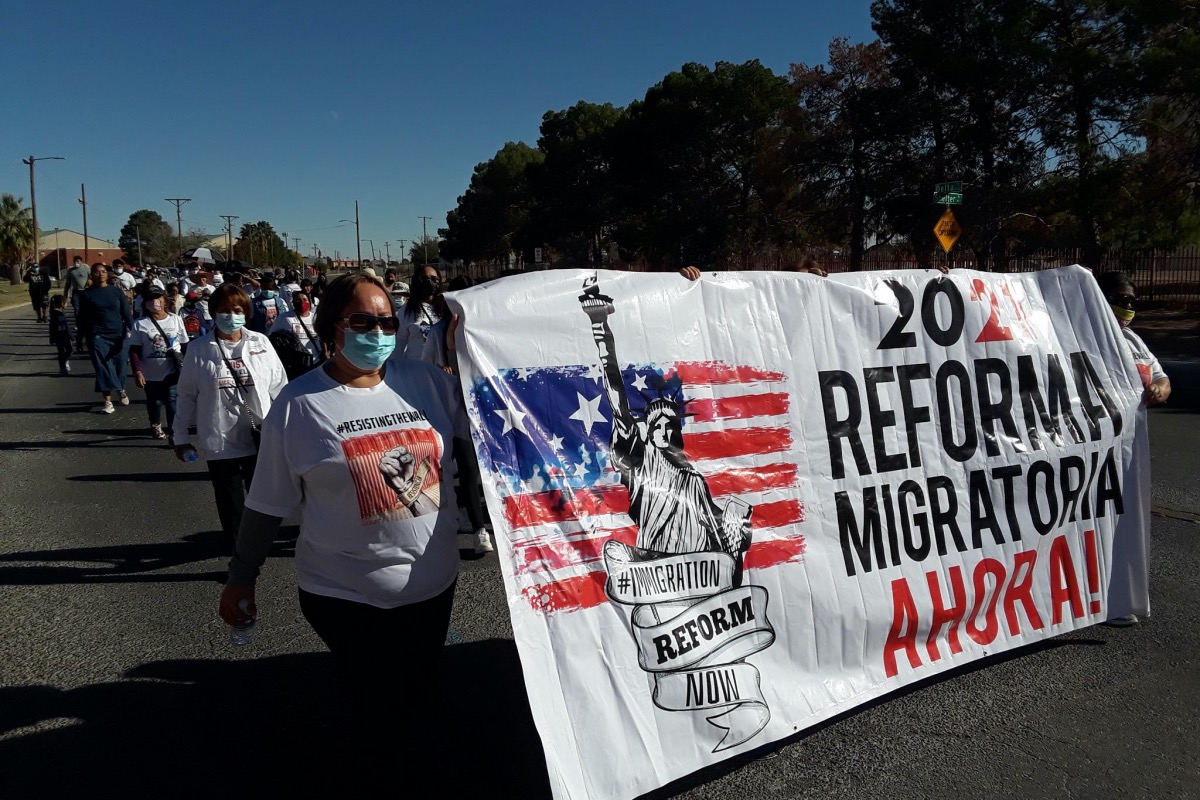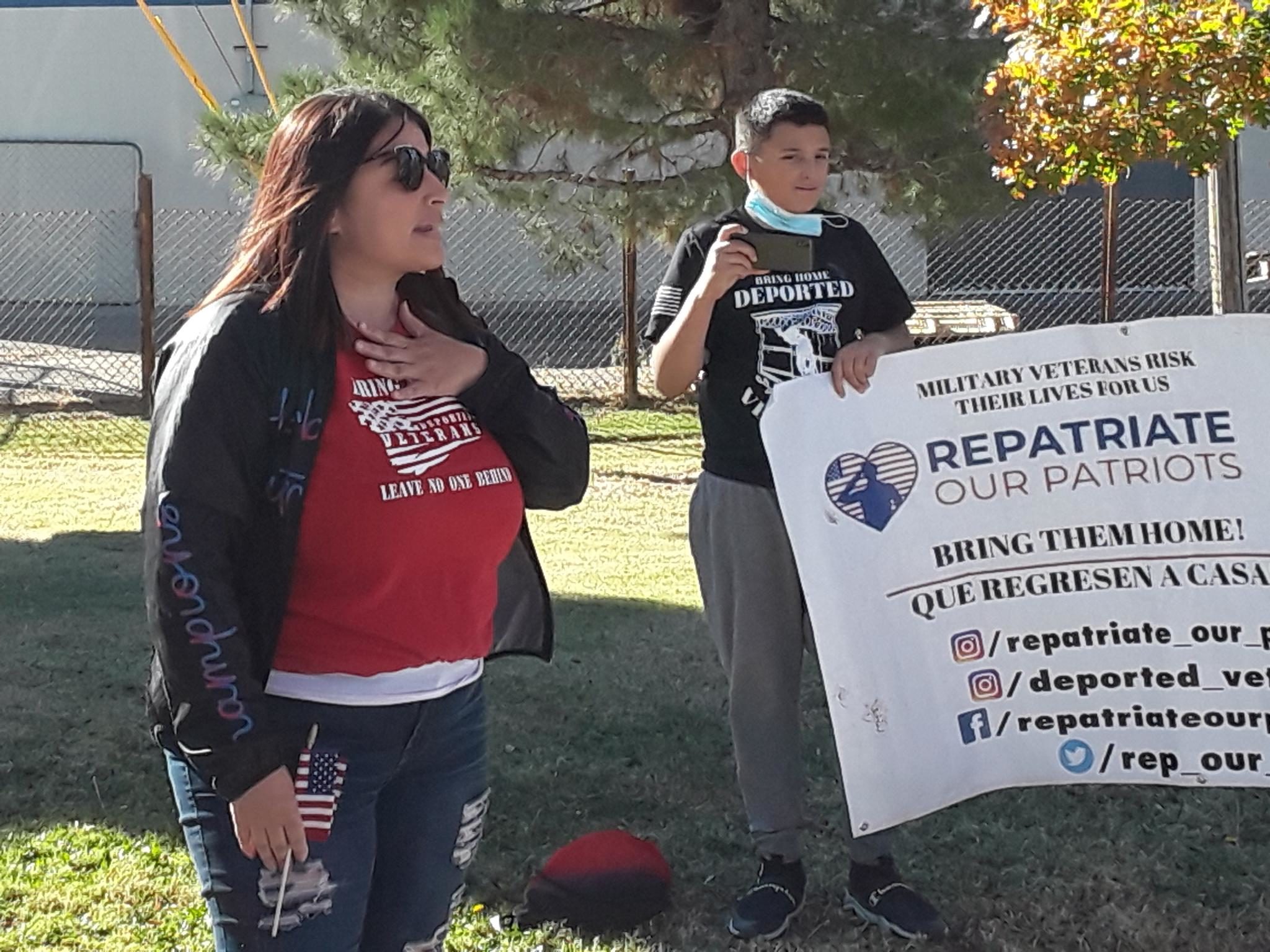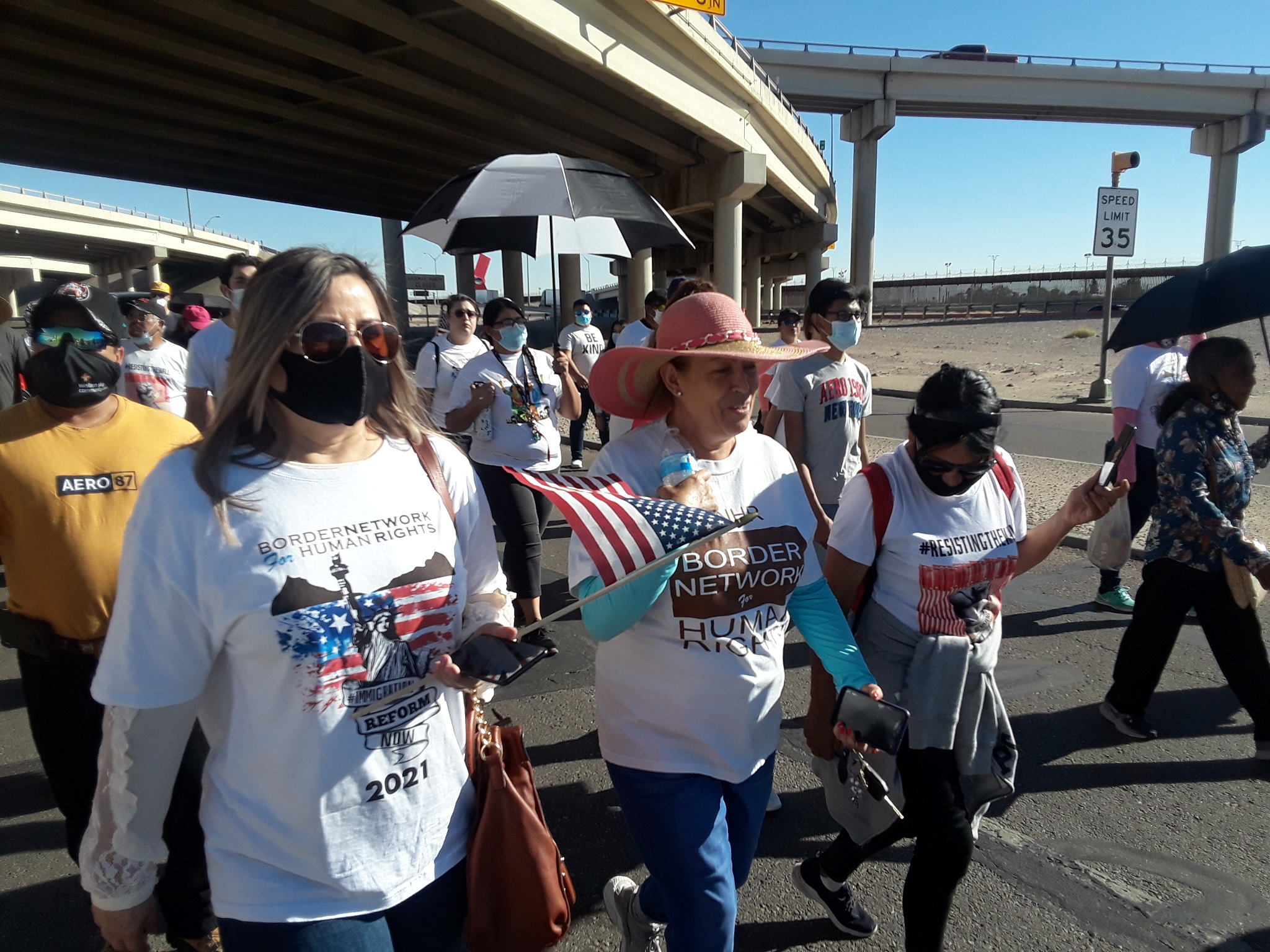

The “11 Miles for 11 Million” march in El Paso, Texas, November 11, 2021. (Alejandro Dominguez/Latino Rebels)
EL PASO, Texas — Ernestina Miranda, 61, spent six years as an undocumented immigrant in the eighties. During that time, she lived in fear of going out of her home thinking she would be detained.
Then, in 1988, she finally got her documents thanks to the immigration reform passed two years before. Now she sees other undocumented immigrants going through the same hardships she suffered three decades ago.
That’s why she participated in the “11 Miles for 11 Million” march on Thursday in El Paso, Texas, calling for a pathway to citizenship.
“I come to support everyone who is here and cannot find job, and to say we deserve rights,” she said in Spanish. “To live well, we need a Social Security number so that we are counted as an individual.”
She is a member of Border Network for Human Rights (BNHR), which hosted the march alongside a coalition of more than 15 organizations from the local and state levels such as Reform Immigration for Texas Alliance (RITA), Repatriate Our Patriots and SEIU Texas, among others.
“The 11 miles represent the 11 million of undocumented immigrants living in the country, and we are calling for a reform to the asylum and refugee systems that were destroyed by Trump,” said Fernando Garcia, executive director of BNHR.
The march was also to remind President Joe Biden of his campaign promises. Garcia said he had seen some positive changes during the Biden administration, such as the repeal of the Migration Protection Protocols, known as the “Remain in Mexico” policy for dealing with asylum seekers. But violence against immigrants is still happening. He mentioned the incident in Del Rio with Border Patrol attacking Haitian immigrants as an example.
“We want to stop the abuse to immigrants and asylum seekers in the border,” Garcia said.
Garcia said the march in El Paso was connected to other marches for immigration reform taking place on the same day in the Rio Grande Valley, San Antonio, and Washington D.C. The New York Immigration Coalition had its march scheduled for Friday at 9 a.m. beginning at Frederick Douglass Circle.
As Thursday was also Veterans Day, veterans were honored during the march with messages of gratitude, and veterans themselves spoke at several stops made during the march.
Claudia Ocon spoke in support of her brother Ivan, 44, a veteran from nearby Las Cruces, New Mexico who served seven years in the Army but was deported in 2016 after spending a decade in federal prison and an ICE detention facility.
“He has paid his dues to the American society,” Ocon said. “At the end of the day, veterans made the ultimate sacrifice by serving their country and now they are living in exile.”


Claudia Ocon of Repatriate Our Patriots speaks at a stop along the “11 Miles for 11 Million” march in El Paso, Texas, November 11, 2021. (Alejandro Dominguez/Latino Rebels)
For the past five years her brother has been living in Ciudad Juárez, his birthplace and El Paso’s neighbor on the Mexican side of the border. Ivan has become a leader of the Deported Veterans Support House there. His case has been taken on by the Veterans Legal Services Clinic at Yale Law School, who managed to have have his crime downgraded to a lesser felony—he was charged with aiding and abetting an armed kidnapping, though he wasn’t an actual participant in the incident involving his brother but knew about it.
According to Yale clinic, the crime no longer bars him from naturalization. Ivan could come back to the country within the year, his sister Claudia said.
“Biden promised laws would change,” Ocon said in her speech. “Veterans must be in the country they risked their lives for, and for that, laws must change.”
The march began in the morning with about 40 people walking along Zaragoza Road, which ends at an international crossing bridge of the same name. The participants carried American flags and signs while chanting phrases in Spanish such as “Biden! Escucha! Estamos en la lucha!” (Biden! Listen! We are in the fight!) and others calling for immigration reform. Some drivers honked their horns in support.
There were two stops before the end of the march at a local high school. At each of these stops, representatives from the participating organizations gave speeches and more people joined the march. By the end of the demonstration, about 100 people were marching, but a total of 200 people were involved in the marching, planning and ferrying of people from the neighboring cities of San Elizario and Las Cruces.
It took two weeks to organize and participation was less than other demonstrations, in part because of the pandemic, said BNHR Coordinator Lourdes Vázquez. All participants had been vaccinated, she said. Most of them were also wearing masks.
There is also distrust of the government that is discouraging people to participate, said BNHR Regional Coordinator Margarita Arvizu.
“We lacked people. We need people to have a conscience and push for an immigration reform,” she said. “People did not participate because they feel betrayed by the government.”


The “11 Miles for 11 Million” march in El Paso, Texas, November 11, 2021. (Alejandro Dominguez/Latino Rebels)
The lack of consensus by both political parties to reach a plan creates this distrust. Arvizu said the government also needs to view immigrants as an asset.
“We need the government to see us and say we are essential workers and integrate us into society,” she said. “We don’t only need permission to work, we need a pathway to citizenship.”
The march was mostly comprised of women, but there were men and children as well. Most people were from the area but there were people from outside El Paso, like Jesús Salcido Chavarría, 25, who is from Austin and attended the march with his wife and a friend.
The march coincided with their trip to El Paso. He wanted to participate to support all the people who are “being exploited by the government and at risk to be separated from their families.”
He also liked that the march provided a space and a platform for different organizations to speak their message. It gave the sense of a shared goal, he said.
“It was beautiful for me seeing people of color unite for a common cause.”
***
Alejandro Dominguez covered immigration and local affairs for six years in Washington state. He is back to his hometown of El Paso-Juárez to cover the uniqueness of living on the border. Twitter: @lafere


